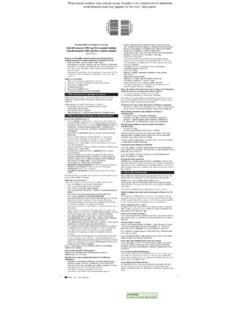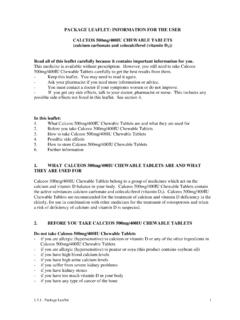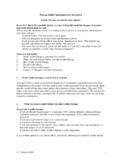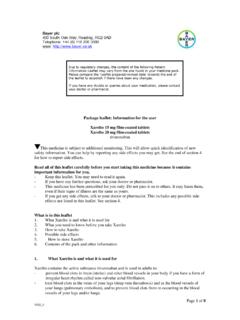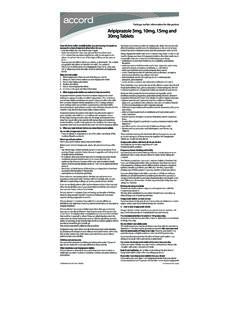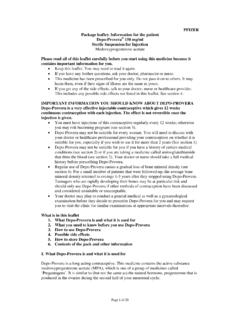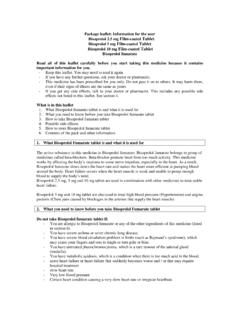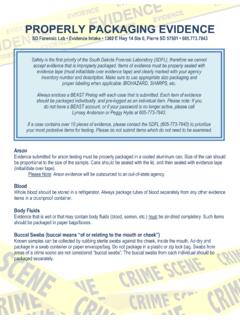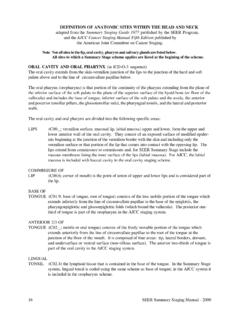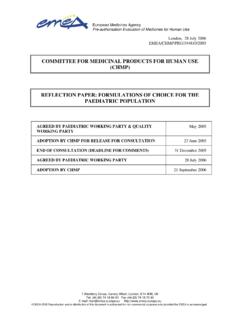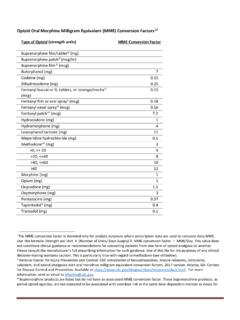Transcription of Prochlorperazine 3 mg Buccal Tablets
1 Prochlorperazine 3mg PIL UK 005 Package leaflet: Information for the user Prochlorperazine 3 mg Buccal Tablets ( Prochlorperazine MALEATE) Read all of this leaflet carefully before you start taking this medicine because it contains important information for you. - Keep this leaflet. You may need to read it again. - If you have any further questions, ask your doctor or pharmacist. - This medicine has been prescribed for you only. Do not pass it on to others. It may harm them, even if their signs of illness are the same as yours. - If you get any side effects, talk to your doctor or pharmacist. This includes any possible side effects not listed in this leaflet. See section 4. What is in this leaflet 1. What Prochlorperazine Tablets are and what they are used for 2.
2 What you need to know before you take Prochlorperazine Tablets 3. How to take Prochlorperazine Tablets 4. Possible side effects 5. How to store Prochlorperazine Tablets 6. Contents of the pack and other information 1. What Prochlorperazine Tablets are and what they are used for Prochlorperazine Tablets are effective in treating nausea (feeling sick) and vomiting (being sick) from whatever cause. They are also used to treat migraine and dizziness due to ear problems and other causes. Prochlorperazine Tablets contain Prochlorperazine maleate. Prochlorperazine belongs to a large group of drugs known as phenothiazines, which have a variety of effects. 2. What you need to know before you take Prochlorperazine Tablets You should only take Prochlorperazine Tablets when your doctor prescribes them for you.
3 Do not take Prochlorperazine Tablets : if you are allergic to Prochlorperazine maleate or any of the other ingredients of this medicine (listed in section 6) if you have problems with your liver if you have blood problems if you suffer from epilepsy, Parkinson s Disease or glaucoma if you have problems with your prostate gland. Warnings and precautions Talk to your doctor before taking Prochlorperazine Tablets : if you are elderly if you are pregnant, thinking of becoming pregnant or breast feeding Prochlorperazine 3mg PIL UK 005 if you have risk factors for a blood clot or stroke such as high blood pressure, high cholesterol levels, diabetes or smoking if you or someone else in your family has a history of blood clots, as medicines like these have been associated with formation of blood clots.
4 If you have a condition called myasthenia gravis, which causes muscle weakness if you have AIDS. Prochlorperazine Tablets may cause you to be more sensitive to sunlight. When taking Prochlorperazine Tablets it is particularly important that you should avoid exposure to direct sunlight and use sunscreen. Other medicines and Prochlorperazine Tablets Tell your doctor if you are taking, have recently taken or might take any other medicines. In particular, tell your doctor or pharmacist if you are taking: sedatives or tranquilisers, used to help you sleep (such as diazepam and temazepam) antihypertensive medicines, used to treat high blood pressure (such as atenolol, propranolol or clonidine) anticholinergic medicines, used for conditions such as depression (such as amitriptyline and imipramine) anticonvulsant medicines used to prevent or treat fits such as carbamazepine and lamotrigine) lithium (used to treat mania and depression) desferrioxamine (used to treat high levels of iron in your body).
5 Prochlorperazine Tablets with food and drink Prochlorperazine Tablets are best taken after food. Do not drink alcohol when taking the Tablets as it may interact with medicines like Prochlorperazine . Pregnancy and breast feeding If you are pregnant or thinking of becoming pregnant, you should only take Prochlorperazine Tablets on your doctor's instructions. The following symptoms may occur in newborn babies of mothers that have used Prochlorperazine Tablets in the last trimester (last three months of their pregnancy): shaking, muscle stiffness and/or weakness, sleepiness, agitation, breathing problems, and difficulty in feeding. If your baby develops any of these symptoms you may need to contact your doctor. Experience with Prochlorperazine Tablets is limited.
6 You should therefore not take the Tablets if you are breast-feeding. Ask your doctor or pharmacist for advice before taking any medicine. Driving and using machines Prochlorperazine Tablets can make you feel drowsy. Therefore you should avoid driving or using dangerous machines until you know how the Tablets affect you. Prochlorperazine Tablets contain sucrose If you have been told by your doctor that you have an intolerance to some sugars, contact your doctor before taking this medicinal product. 3. How to take Prochlorperazine Tablets Prochlorperazine 3mg PIL UK 005 Always take this medicine exactly as your doctor has told you. Check with your doctor if you are not sure. The recommended dose is one or two Tablets twice a day for adults and children over 12 years of age.
7 Prochlorperazine Tablets are not recommended for children under 12 years of age. INSTRUCTIONS FOR USE Please read carefully before taking the tablet(s). Place the tablet high up along your top gum, under the upper lip either side of your mouth as indicated above. The tablet must not be swallowed whole or chewed. The tablet will soften and adhere to the gum. Allow it to dissolve slowly and completely - this may take between 1 and 2 hours. Most people find that after a few minutes they no longer notice the tablet. The tablet should not be moved about the mouth with the tongue as this will cause it to dissolve too quickly. If you wear dentures, the tablet may be placed in any comfortable position between your lip and gum.
8 The tablet(s) is best taken after meals. If you take more Prochlorperazine Tablets than you should If you accidentally take too many Tablets you must seek medical attention immediately. Show any left-over medicines or the empty packet to the doctor. If you forget to take Prochlorperazine Tablets If you forget to take a dose do not double the dose next time. Just carry on taking the medicine as the doctor has told you. 4. Possible side effects Like all medicines, Prochlorperazine Tablets can cause side effects, although not everybody gets them. Serious side effects If you experience any of the following side effects, you should stop taking Prochlorperazine Tablets and contact your doctor immediately: Symptoms of an allergic reaction such as rash and swelling of the face, tongue or throat.
9 A high temperature, pale complexion, muscle stiffness and changes in levels of alertness, you may have developed a serious condition called neuroleptic malignant syndrome. Prochlorperazine 3mg PIL UK 005 Convulsions (fits). Signs of infection such as shivering, headache, sweating, high temperature, flushing, a sore throat or mouth and swollen glands. Blood clots in the veins especially in the legs (symptoms include swelling, pain and redness in the leg), which may travel through blood vessels to the lungs causing chest pain and difficulty in breathing. Symptoms of decreased sodium concentration in the blood, such as nausea and vomiting, headache, confusion, loss of energy, restlessness, muscle weakness, spasms or cramps, seizures and coma.
10 In elderly people with dementia, a small increase in the number of deaths has been reported for patients taking medicines of the same type as Prochlorperazine Tablets compared with those not taking these medicines. Other side effects include: drowsiness dizziness dry mouth inability to sleep (insomnia) agitation skin reactions increased sensitivity to sunlight low blood pressure (this makes you feel dizzy or faint, particularly when you stand up), particularly in elderly or volume depleted patients (those who have lost both water and salts from the body). high blood sugar level, which can cause increased thirst, a dry mouth, needing to urinate frequently, tiredness and recurrent infections such as thrush a condition known as cholestasis where bile cannot flow properly in the body, and can cause itchiness, jaundice (yellowing of the skin and/or the whites of the eyes), pale stools and dark urine abnormal movements, tremors and muscle rigidity, and unusual movements of the face and tongue impotence, ejaculation problems and persistent/ painful erections local irritation to the gum and mouth.

